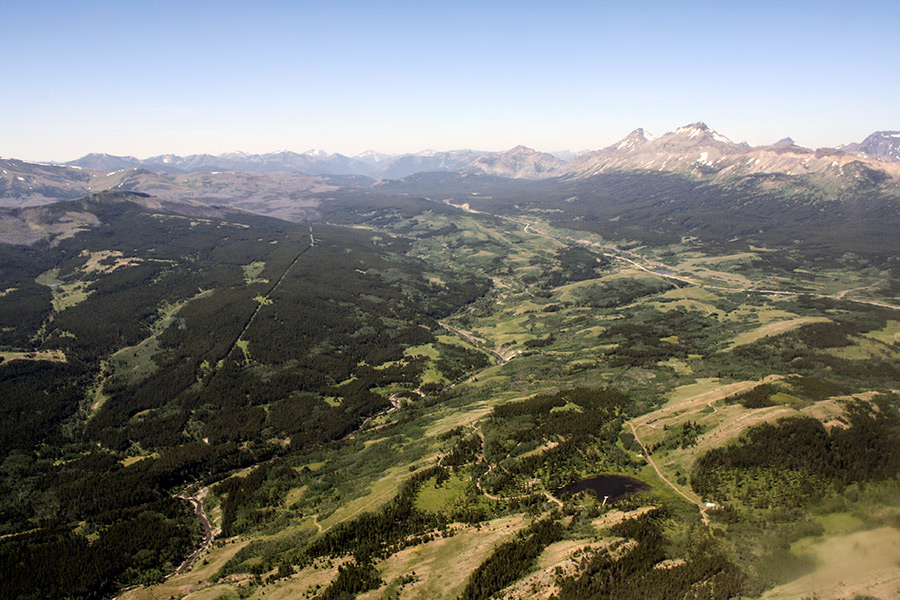Interior Stands by One Lease Cancellation in Badger-Two Medicine, Steps Away from Another
With only two oil and gas leases remaining in sacred Blackfeet territory, tribe presses on in mission to protect the region
By Tristan Scott
In a dramatic change of course, attorneys representing the U.S. Department of the Interior filed paperwork announcing they will not defend the cancellation of one of the last remaining oil and gas leases on the 130,000-acre Badger-Two Medicine, an area flanking Glacier National Park that holds cultural and ecological significance to members of the Blackfeet Nation.
Former Interior Secretary Ryan Zinke, a Whitefish native, had previously said he would defend the lease cancellations.
While members of the Blackfeet Nation expressed disappointment and frustration in the Interior’s decision not to fight an appeal by lease-owner W.A. Moncrief Jr, the Interior Department is expected to defend the cancellation of a second lease held by Solenex LLC of Baton Rouge, which is also being fought on appeal.
The leases were originally canceled by the Interior Department under President Barack Obama, but U.S. District Judge Richard J. Leon ruled last September that action was improper. Last November, attorneys representing the Interior filed a notice of appeal challenging Judge Leon’s decision to reinstate the leases.
In a statement to reporters, Blackfeet Tribal Business Council Chairman Tim Davis said the decision is a marked departure from the government’s earlier pledge to defend the Badger-Two Medicine; however, members of the Blackfeet Nation will continue to work to protect the region from development in perpetuity.
“While we are disappointed that the U.S. government and DOI have chosen not to honor commitments made to our Nation by fully defending our lands in court, we look forward to working alongside our federal partners to resolve these issues through negotiation, settlement and exchange,” Davis wrote in a statement.
Davis said the tribe’s attempt to negotiate with Solenex and Moncrief have included remuneration in the form of tax credits, cash buybacks, federal lease credits, land leases elsewhere on the Blackfeet Reservation, and even pre-drilled wells in Blackfeet oil fields. Still, he said, “they have persisted in legal challenges.”
John Murray, tribal historic preservation officer for the Blackfeet Nation, said the government’s decision to dismiss the Moncrief case is a setback in the tribe’s ongoing quest to defend the Badger, but he expressed confidence in the path forward, which will include negotiations with the lease-holder.
Murray also noted that unlike Solenex, which acquired a permit drill on its lease decades ago — although that permit has been beset with legal challenges — Moncrief has no such permit. That means the company would be required to endure years of environmental review, as well as undergo additional layers of review because the Badger-Two Medicine is a Traditional Historic District. The National Historic Preservation Act requires such districts to go through a cultural review.
“It could go on for years and cost millions,” Murray said. “It’s in the best interest of everyone to sit down and negotiate, and as I understand it that door is potentially open. Moncrief is at least open to idea. This could really look good on their part. Look at the other energy companies that voluntarily relinquished leases. They basically just said it is the right thing to do.”
In a joint statement from the Pikuni Traditionalist Association and the Blackfeet Headwaters Alliance, tribal members pledged to defend efforts to explore for oil and gas in the Badger-Two Medicine at every turn.
“Moncrief Oil has a long and expensive road ahead if it wishes to pursue a permit to drill, and we will be there every step of the way to defend the Badger-Two Medicine,” according to the statement. “We will not allow this region to be industrialized, and will use every tool available to protect this last refuge of the Rocky Mountain Front.”
Tim Preso, an attorney for the Bozeman-based environmental firm Earthjustice representing the Pikuni Traditionalist Association as an intervenor in the case, said he has prepared briefs defending the lease cancellations both in the Moncrief case and the Solenex case, which he’ll file April 4.
“We press on,” Preso said after meeting with Murray and others on the Blackfeet Indian Reservation.
The saga of oil and gas leases in Badger-Two Medicine, which is the site of the creation story for the Blackfeet, has been ongoing for more than 30 years, since Solenex and others first acquired leases in the area. In that time, the company has not done any drilling on the land, and after decades of bureaucratic delays, Solenex sued the federal government in 2013.
Michael Jamison, of the National Parks Conservation Association, said commitment to protect the Badger remains strong, and hails from all corners.
“It’s disappointing that the government has not followed through with a full defense of the Badger as they suggested they would, but I think the important thing to remember is that they are going to pursue the cancellation of the Solenex lease and Solenex has a permit to drill,” Jamison said. “The decision to not pursue the cancellation of the Moncrief lease is disappointing, but Moncrief has a lot to do before they can begin work. It’s not great and it’s not the end of the world.”
He added: “I would also say I am absolutely confident that given time, the Badger will be protected.”